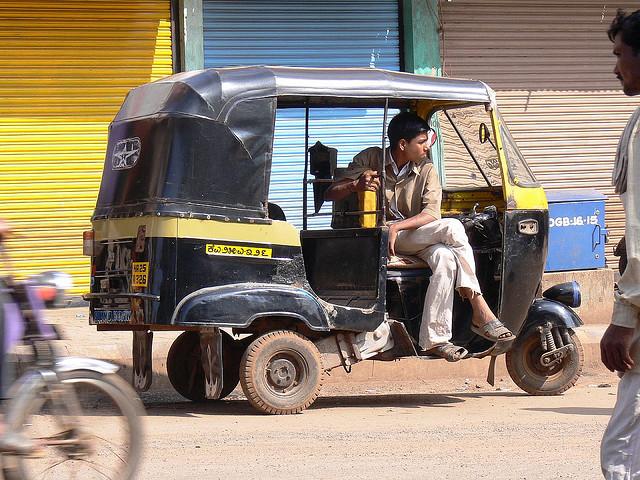
Some of the most inspiring people you’ll ever meet come from the working class of India. They often work long hours with no days off. They house their family, educate their children, and put rice on the table, all with a budget that you probably couldn’t last a few weeks on.
The working class of India is inspiring, but is also daunting for many outsiders to deal with, especially when you are face-to-face, trying to negotiate the price of an auto rickshaw ride, or a monthly salary for washing your car.
Overall, I’ve had a tremendous experience with this group of people. At least in Chennai, we’ve found them to be hardworking, friendly, and welcoming to us as foreigners. We can almost always trust the person to do a good job and quote a reasonable rate.
But what is reasonable? How do you know if you are paying the right amount? And what if the right amount seems absurdly low to you? When should you negotiate a better price, and when should you accept your privilege in life as a means to help others?
These aren’t easy questions to deal with, but everyone here has to do it at some point.
Why Negotiate for Paying Local Rates?
The main reason usually given is that if a large number of foreigners start paying a lot more for a service, it causes inflation and makes things unaffordable for middle class (or classic) families. This can also encourage certain service providers to give preference to foreigners rather than locals. An auto driver can drive around all day ignoring other riders and cover all of his expenses by finding one foreigner who pays more.
Imagine if a steady flow of Martians came to your home and decided that they are willing to pay triple the normal rate for someone to fix your car. After a while, you see a few shops that are clearly for Martians only. You can see how that would adversely affect the market.
While the majority of service providers are honest people whom you could trust to watch your baby (literally), there are a few bad apples out there. The kind of rates they request are extortionate, even if it seems fairly reasonable by your home standards. You don’t want to encourage this kind of behavior.
We had a guy come and cut a hole in our ceiling to install a swing. We expected the charges to be about Rs. 500 – Rs. 1500, but he wanted to charge us Rs. 4000. Our neighbors would have been furious if we had paid that much, both because we had been cheated and because we were willing to be ripped off like that.
Why Pay More?
India’s per capita income in 2013 was $1,570. That works out to about Rs. 8,500 per month.
Goodness gracious! How can you live on that? If we have more than enough to meet our needs, what is the problem with giving a little extra now and again?
Compassionate Transactions
The best balance that I’ve found is in something called Compassionate Transactions. On the one hand, these are business transactions, not charity. If you end up paying more for a particular service, you should get a good job done. Don’t forget the fact that you are a player in the local economy and have an obligation to uphold good business practices.
However, you can still be compassionate. These are individuals who have a family behind them that they’re trying to support. Pay a living wage or fee that makes it possible for that person to continue providing the service and/or find other non-cash ways to support their lives and make an investment.
Best Practices for Negotiating Compassionate Transactions
Pay standard rates
If there is a rate posted for work, follow it. For example, porters at train stations have standard charges per bag. Someone who comes to your house to fix an AC will have a set rate if they come from a company. Don’t participate in a negotiation if the rate is set, but you can give a small tip for good service.
Consider how often you will see them
When getting an auto, I negotiate a lot less if I am going to an area of town I don’t know or riding with an auto driver I would likely never meet again. However, for a nearby trip from the auto stand near my home, I know I will have to work hard to establish a good base rate. Similarly, you want to pay as close to ‘local’ as possible with domestic help and handymen.
Ask an Indian
The ideal situation is if someone just got the same service from someone and you ask your friend what he paid (not a taboo topic). This way they can also give recommendations, which increase the chances that you will pay the right rate. You can also have this person fix the price for you with someone. Sometimes it is best if you don’t show your non-Indian face during the negotiation.
Don’t ask for help from someone who doesn’t use that service much at all. There was a season when we took a lot of auto rickshaws around the city, but our friends hadn’t ridden one in years. They insisted on negotiating the rate for us, thinking it should be about Rs. 30 when we knew it was more like Rs. 60 by the current standards. We ended up paying Rs. 80.
One of the great parts of living in India is that you get to interact with all kinds of levels of society, right at your front door. Negotiating for reasonable rates is a skill you need to pick up on, but you don’t have to be alone. Think through your own response to Compassionate Transactions and share some thoughts and experiences in the comments!
Image Credit: Prashanth NS on Flickr





Really useful post, Neil, for me as an Indian! One might think that it’s expats who have to deal with all this and Indians are comfortable driving a hard bargain, but not me for example. Perhaps it’s because I didn’t grow up in one place and I’ve spent many years abroad, so I’m not too comfortable with the working class in any part of India. I tend to err on the compassionate side!
Great point, Ravi. These are things that everyone has to deal with, not just outsiders!
Neil, The default assumption in the mind of the service provider (giver) is that the recipient of that service (receiver) will always negotiate and try to bring the price down. I think this is universal, but more so in India. I tend not to negotiate much. Or even when I do, I see the peripherals- for e.g. does the streetside hawker have a young kid? Maybe with the extra five rupees, the hawker could buy a pack of Parle G biscuits. (I lover them myself, by the way!) And so on.. but when I see that the quality of work is poor compared to the price I am paying, then I negotiate real hard- try to reason, and usually am successful in either getting the work fixed, or pay a lower price. There’s no shame in paying less for sub standard work in my opinion.
Nice perspective. Thanks a lot for sharing!
Not sure if I’m on the right track, but here are a couple of guidelines I have found helpful.
1) If possible, observe or move in next to a local who is in the process of making a purchase of something you want. Eavesdrop to hear the price, or just be blunt and ask the other buyer what the price they are paying. This is a good way to purchase something in which you have no idea what a good price is and to protect yourself from getting completely ripped off.
2) Make as many Indian friends as you can; they will look out for you. They’ll gladly give you advice on how much you should pay for things (even when you don’t ask for it!) and will ask you how much you paid for nearly everything. After experiencing the embarrassing shame of admitting that you paid grossly more than is reasonable, you’ll naturally become more careful about your purchase habits.
3) Remember that a vendor won’t go through with a transaction if there if they will lose money on the deal, even when the price seems low, know that they still made a margin or small profit out of it. We are participating in a local market economy and should do our best to not skew the balance unnecessarily. Example, I pay 50 rupees for my haircut, when in the states I’d have to pay $15. My barber keeps cutting my hair every time I go see him, so he must be making a margin on his time. If next week he decides to raise the price to 70 rupees I’m of course not going to object, but surely I wouldn’t want to pay 900 rupees for a single haircut!
4) Remember that time has value. I try to negotiate a little bit, but won’t spend too much time at it, because I’d rather spend my time (very western thinking) on things I perceive as more important. I often consider the trade off of time in my negotiation. For example, I might know that I can get a rickshaw ride to a certain place for 100 rupees, but it might take me 10 minutes to find a driver to take me. I might pay someone 150 or 170 if it saves me 10 minutes of haggling. To me, that is rational trade off that justifies paying a little more at times.
5) Reward the things you value. For example, I highly value trustworthy people, good service, and honesty. I try to punish poor service and dishonesty with a closed wallet. When you find a vendor that charges you fair and reasonable local market rates and doesn’t try to gouge you, reward that behavior with frequent visits and purchases. I never go back to a vendor that overcharged simply because I was a foreigner. It is rational consumer behavior to pay more for the things we value. This is another way I can justify paying a potentially inflated price without it becoming charity.
Sorry for the lengthy post!
These are all great things, Ryan! Thanks for adding to the conversation. I agree with all of them, but I’ve seen some nuances with #3.
When I was working with a carpenter, we reached a deal on some work he was doing. After he finished, I asked him to do a little more work, but he quoted an extremely high number and he said he had lost money on the first transaction and wanted to make it up. I didn’t go forward with him.
This was one of those one-time situations and not regular service (like a haircut), but there are situations where someone will not realize they are losing money on a deal until afterwards and will give a lot of indirect signals that they want out of the relationship.